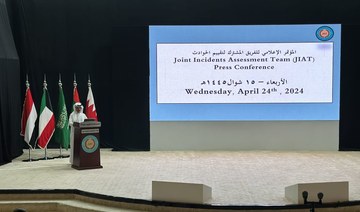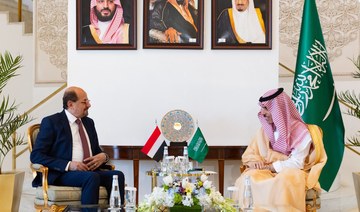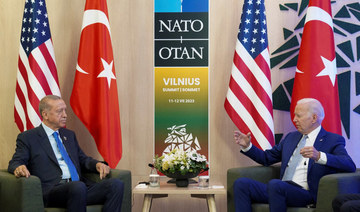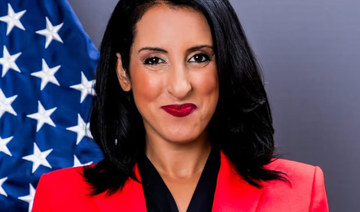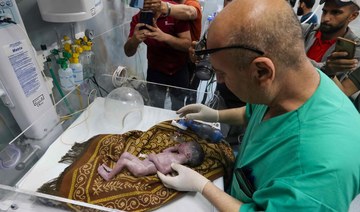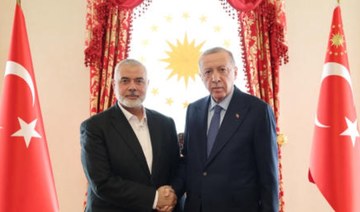BAGHDAD: Under the sign “Take out only” and a tall bottle of antiseptic by his side, Mazin Hashim, 54, rearranged the coals heating a water pipe outside his famed cafe in Baghdad.
He put up the placard to satisfy recent government restrictions on movement and gatherings that are aimed at slowing the outbreak of the new coronavirus. Once inside, however, thick white plumes of fragrant smoke choked the air as over a dozen young men whiled away the hours in defiance of the directives.
As the pandemic continues to spread, governments across the Middle East are clamping down on the region’s cherished traditions: No more massive weddings and celebrations. Restrictions on sales of qat, a mild plant narcotic chewed in groups in Yemen. No more evenings spent mostly by men in traditional coffee shops across the region. And most importantly, no more smoking of the beloved shisha, or water pipe, in public places.
In a region where life is often organized around large families, communal meals and tribal rules, social distancing can be difficult.
In Iraq, clarion calls sound twice a day to remind people to adhere to the ban on public gatherings. But that has little impact at Hashim’s shisha parlor, second home to 29-year-old Mustafa Ahmed who comes every day to meet friends and seek solace from the monotony of domestic life.
Not even at the height of Iraq’s sectarian wars was he made to spend seven straight days at home. He and his friends smoked shisha at Hashim’s instead.
“It’s normal for us to come here during times of crisis,” said Ahmed. “The only difference this time is we are hiding from the police.”
Safety tips being traded by many in Iraq often fly in the face of global appeals by experts to avoid physical contact and keep a safe distance from others.
Iraq’s revered Grand Ayatollah Ali Al-Sistani, whose opinion is sought by many, said it was necessary to avoid shaking hands, hugging and kissing except when the “necessary precautions” were taken, including sterilization, masks and gloves.
But Hashim said his acquaintances routinely ignore even such warnings. In Iraq, the custom is to plant one kiss on each cheek. That is why he keeps the bottle of antiseptic nearby.
“Whenever someone greets me I quickly wipe my hands and face with it,” he said.
Down the street from Hashim, Tony Paulis, 60, said he tried to promote social distancing with a poster outside his barbershop door. It has an “X” over an image of two men leaning in for a greeting, and a warning message: “Please limit yourselves to handshakes and do not kiss given the current difficult situation.”
The attempt was futile. “Iraqis aren’t scared of coronavirus, but they should be,” he said.
At least 40 people have died in Iraq from the coronavirus, which causes mild or moderate symptoms in the majority of people but can cause more severe illness, including pneumonia, or death for some, especially older adults and people with existing health problems.
Checking out with a kilo (two pounds) of oranges from the local grocer in Baghdad’s Karrada neighborhood, Najm Abdullah Saad, 70, said the curfew was wreaking havoc on his marital life.
“Going out to smoke shisha every night was my escape,” he said.
Shisha-smoking isn’t the only public pastime affected.
In Yemen, which has already endured five years of civil war, the chewing of qat is a daily activity that brings groups together to exchange gossip and debate.
Authorities in Yemen’s southern city of Aden have banned qat markets to prevent the spread of the virus. However vendors have found ways to keep selling it, either with help from armed factions controlling the city, or in the outskirts.
In the north, which is controlled by the Houthi militia, authorities said they plan to move crowded qat markets to open areas and ban gatherings of more than eight people.
The measures might be hard to implement as the country has busy markets in almost every city and town. At around noon every day some 90% of Yemeni men converge on local markets to buy qat, according to Houthi health ministry spokesman Youssef Al-Hadhri. He said markets will remain open since they become crowded only a couple of hours a day.
“It’s not dangerous,” he insisted, despite growing fears that an outbreak could prove devastating to the Arab world’s poorest country.
The Lebanese port city of Sidon, south of the capital Beirut, is mostly deserted. It once bustled with people flocking to its traditional coffee shops where elderly men gathered to smoke cigarettes and play cards and backgammon. Those closed after the Lebanese government ordered a lockdown last week.
Qassem Bdeir, a fisherman, sat with a group of friends near a hidden segment of the port, discussing the situation, each seated a meter away from the other.
“We used to meet at the coffee shop after a day’s work to talk and play cards. Now there’s no work, and we steal these few moments to talk and commiserate sitting away from each other before we go home to lock ourselves up,” he said.
The virus has also upended plans for weddings — often extravagant affairs in the region, with hundreds of invitees.
In Beirut, Bassam Makki, the 42-year-old owner of a jewelry shop had been in the final stages of planning his wedding when the pandemic started. He and his fiance took out a loan and planned a celebration for 130 people at a four-star hotel in Beirut. The party, which had been scheduled for April 10, has been canceled.
“I guess it wasn’t meant to be,” he said, trying to offer a smile.
Others pressed ahead with weddings.
Rawan Mohammed found an open tract of agricultural land outside the northern Iraqi city of Dohuk for his wedding after the Kurdistan Regional Government closed wedding halls as part of preventive measures.
“We told everyone at the beginning, they can come by to tell us congratulations and take pictures, but without handshaking or hugging,” he said.
With virus, cherished Mideast traditions come to abrupt halt
https://arab.news/8ujyu
With virus, cherished Mideast traditions come to abrupt halt
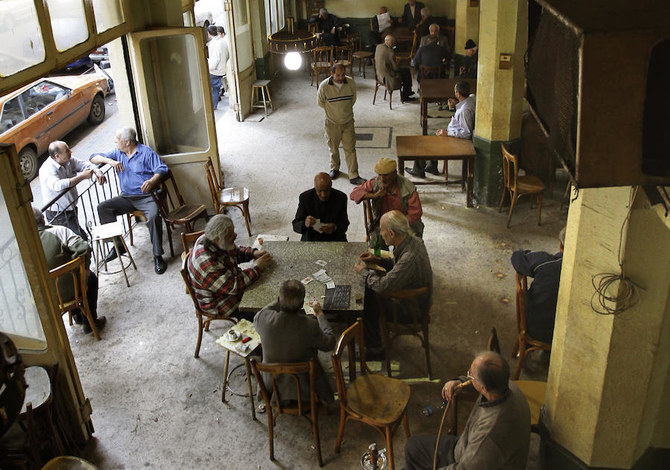
- In a region where life is often organized around large families, communal meals and tribal rules, social distancing can be difficult
- The virus has also upended plans for weddings — often extravagant affairs in the region, with hundreds of invitees
Yemen’s Houthis say their missile hit Andromeda Star oil ship in Red Sea
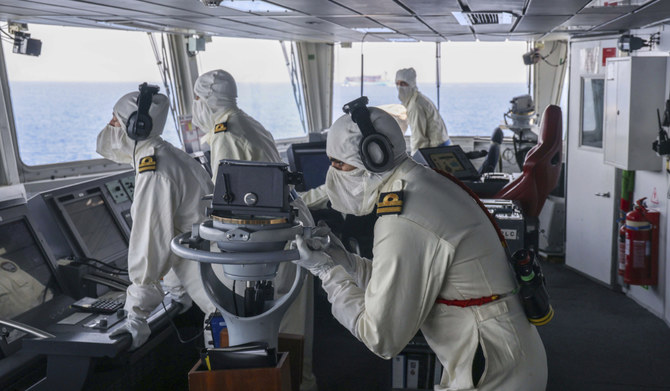
- Israel has killed more than 34,000 Palestinians, according to Gaza’s Health Ministry
- The Houthis on Friday said they downed an American MQ-9 drone in airspace of Yemen’s Saada province
CAIRO/LOS ANGELES: Yemen’s Houthis said on Saturday their missiles hit the Andromeda Star oil tanker in the Red Sea, as they continue attacking commercial ships in the area in a show of support for Palestinians fighting Israel in the Gaza war.
The ship’s master reported damage to the vessel, British maritime security firm Ambrey said.
Houthi spokesman Yahya Sarea said the Panama-flagged ship was British owned, but shipping data shows it was recently sold, according to LSEG data and Ambrey.
Its current owner is Seychelles-registered. The tanker is engaged in Russia-linked trade. It was en route from Primorsk, Russia, to Vadinar, India, Ambrey said.
Iran-aligned Houthi militants have launched repeated drone and missile strikes in the Red Sea, Bab Al-Mandab Strait and Gulf of Aden since November, forcing shippers to re-route cargo to longer and more expensive journeys around southern Africa and stoking fears the Israel-Hamas war could spread and destabilize the Middle East.
The attack on the Andromeda Star comes after a brief pause in the Houthis’ campaign that targets ships with ties to Israel, the United States and Britain.
The USS Dwight D. Eisenhower aircraft carrier sailed out of the Red Sea via the Suez Canal on Friday after assisting a US-led coalition to protect commercial shipping.
The Houthis on Friday said they downed an American MQ-9 drone in airspace of Yemen’s Saada province.
Syrian woman is jailed for life over Istanbul killer blast; over 20 others also get prison sentences
Syrian woman is jailed for life over Istanbul killer blast; over 20 others also get prison sentences
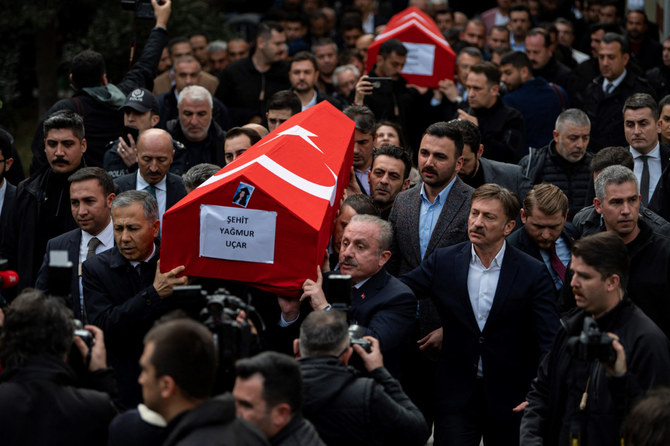
- Ahlam Albashir was given a total of seven life sentences by a Turkish court for carrying out the attack in Istiklal Avenue on Nov. 13, 2022
- Twenty others were given prison sentences ranging from four years to life
JEDDAH: A Syrian woman who planted a bomb that killed six people in Istanbul’s main shopping street 18 months ago was jailed for life on Friday.
Ahlam Albashir was given a total of seven life sentences by a Turkish court for carrying out the attack in Istiklal Avenue on Nov. 13, 2022. Six Turkish citizens, two members each from three families, died in the blast in the busy street packed with shoppers and tourists. About 100 people were injured.
More than 30 other people were accused in connection with the explosion. Four were released from prison on Friday, and a further 10 were ordered to be tried separately in their absence because they could not be found.
Twenty others were given prison sentences ranging from four years to life. Of those, six received aggravated life imprisonment for murder and “disrupting the unity and integrity of the state.”
Turkiye blamed Kurdish militants for the explosion, and said the order for the attack was given in Kobani in northern Syria, where Turkish forces have conducted operations against the Syrian Kurdish YPG militia in recent years.
The YPG and the outlawed PKK Kurdish separatist group, which has fought a decades-old insurgency against the Turkish state, denied involvement in the attack. No group admitted it.
Istanbul has been attacked in the past by Kurdish, Islamist and leftist militants. A wave of bombings and other attacks began nationwide when a ceasefire between Ankara and the PKK broke down in mid-2015.
More than 40,000 people have been killed in the PKK’s conflict with Turkiye since the militant group took up arms in 1984. It is considered a terrorist organisation by Turkiye, the EU and the US.
1 case dismissed, 4 on hold in UN investigation into Oct. 7 allegations against UNRWA staff
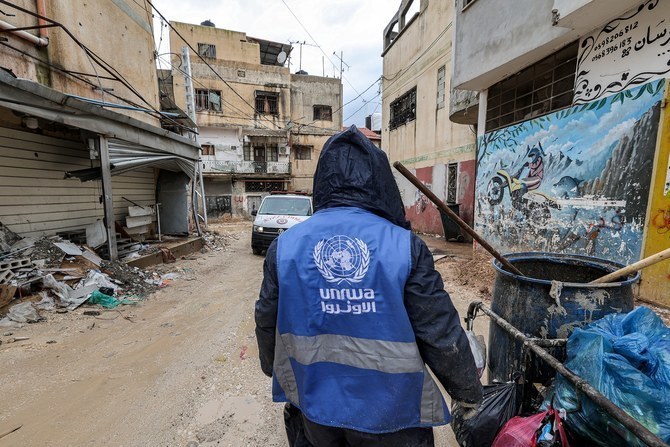
- Investigators have been looking into cases of 12 agency workers accused by Israel in January of participating in attacks by Hamas, and 7 others named later
- 14 cases remain under investigation but the others were dismissed or suspended due to lack of evidence; UN’s internal investigators due to visit Israel again in May
NEW YORK CITY: UN spokesperson Stephane Dujarric said on Friday that the organization’s internal oversight body has been investigating 19 employees of the UN Relief and Works Agency for Palestine Refugees over allegations that they were affiliated with Hamas and other militant groups.
Israeli authorities alleged in January that 12 UNRWA workers participated in the Oct. 7 attacks by Hamas against Israel.
The agency immediately cut ties with the named individuals, and UN Secretary-General Antonio Guterres, in consultation with UNRWA Commissioner General Philippe Lazzarini, ordered an independent review to evaluate the measures taken by the agency to ensure adherence to the principle of neutrality and how it responds to allegations of breaches of neutrality, particularly in the challenging context of the situation in Gaza.
In a wide-ranging report published this week, the investigators, led by Catherine Colonna, a former foreign minister of France, said Israeli authorities have yet to provide any evidence to support the allegations against UNRWA workers. They also noted that Israel had not previously raised concerns about any individuals named on the agency staffing lists it has been receiving since 2011.
They stated in the report: “In the absence of a political solution between Israel and the Palestinians, UNRWA remains pivotal in providing life-saving humanitarian aid and essential social services, particularly in health and education, to Palestinian refugees in Gaza, Jordan, Lebanon, Syria and the West Bank.
“As such, UNRWA is irreplaceable and indispensable to Palestinians’ human and economic development. In addition, many view UNRWA as a humanitarian lifeline.”
Guterres also ordered a separate investigation by the UN’s own Office of Internal Oversight Services to determine the accuracy of the Israeli allegations. The mandate of the OIOS, an independent office within the UN Secretariat, is to assist the secretary-general in the handling of UN resources and staff through the provision of internal audit, investigation, inspection and evaluation services.
Dujarric said the 19 members of UNRWA staff under investigation included the 12 named by the Israeli allegations in January, whose contracts were immediately terminated, and seven others the UN subsequently received information about, five in March and two in April.
Of the 12 employees identified by Israeli authorities in January, eight remain under OIOS investigation, Dujarric said. One case was dismissed for lack of evidence and corrective administrative action is being explored, he added, and three cases were suspended because “the information provided by Israel is not sufficient for OIOS to proceed with an investigation. UNRWA is considering what administrative action to take while they are under investigation.”
Regarding the seven additional cases brought to the attention of the UN, one has been suspended “pending receipt of additional supporting evidence,” Dujarric said.
“The remaining six of those cases are currently under investigation by OIOS. OIOS has informed us that its investigators had traveled to Israel for discussions with the Israeli authorities and will undertake another visit during May.
“These discussions are continuing and have so far been productive and have enabled progress on the investigations.”
The initial allegations against some members of its staff threw the agency, which provides aid and other services to Palestinian refugees in Gaza and across the region, into crisis. The US, the biggest single funder of UNRWA, and several other major donors put their contributions to the organization on hold.
In all, 16 UN member states suspended or paused donations, while others imposed conditions on further contributions, putting the future of the agency in doubt. Many of the countries, including Germany, later said their funding would resume. However, US donations remain on hold.
37 million tonnes of debris in Gaza could take years to clear: UN
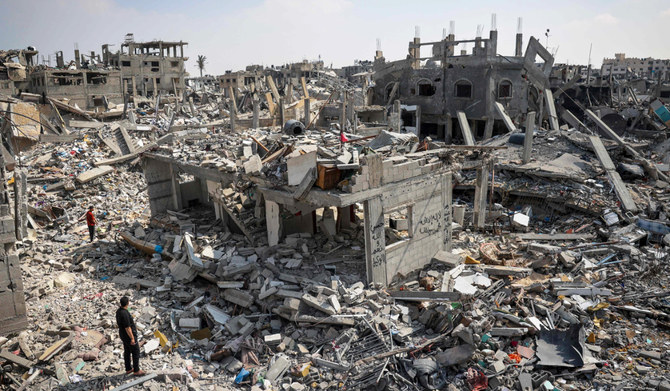
- “We do know that we estimated 37 million tonnes of debris, which is approximately 300 kg per square meter,” Lodhammar added
GENEVA: There are some 37 million tonnes of debris to clear away in Gaza once the Israeli offensive is over, a senior official with the UN Mine Action Service said on Friday.
And unexploded ordnance buried in the rubble would complicate that work, said UNMAS’ Pehr Lodhammar, who has run mine programs in countries such as Iraq.
It was impossible to say how much of the ammunition fired in Gaza remained live, said Lodhammar.
“We know that typically there is a failure rate of at least 10 percent of land service ammunition,” he told journalists in Geneva.

“We do know that we estimated 37 million tonnes of debris, which is approximately 300 kg per square meter,” he added.
He said that starting from a hypothetical number of 100 trucks would take 14 years to clear away.
Lodhammar was speaking as UNMAS launched its 2023 annual report on Friday.
The war in Gaza between Israel and Hamas erupted when Hamas launched an unprecedented attack on Israel on Oct. 7.
Also on Friday, the head of an aid group warned that an Israeli assault on southern Gaza’s Rafah area would spell disaster for civilians, not only in Gaza but across the Middle East,
Jan Egeland said the region faced a “countdown to an even bigger conflict.”
Egeland, the secretary-general of the Norwegian Refugee Council, also said that 1.3 million civilians seeking refuge in Rafah — including his aid group’s staff — were living in “indescribable fear” of an Israeli offensive.
Egeland urged Israeli Prime Minister Benjamin Netanyahu not to proceed with the operation.
“Netanyahu, stop this. It is a disaster not only for the Palestinians, it would be a disaster for Israel. You will have a stain on the Israeli conscience and history forever,” he said.
The NRC head spoke to Reuters in Lebanon, where he visited southern villages that he said were caught in a “horrific crossfire” between the Israeli military and Hezbollah.
“I am just scared that we haven’t learned from 2006,” said Egeland, referring to the month-long war between Hezbollah and Israel that was the two foes’ last bloody confrontation, during which he headed the UN’s relief operations.
“We do not need another war in the Middle East. At the moment, I’m feeling like (this is a) countdown to an even bigger conflict,” he said.
Turkiye’s Erdogan postpones tentative White House visit, sources say
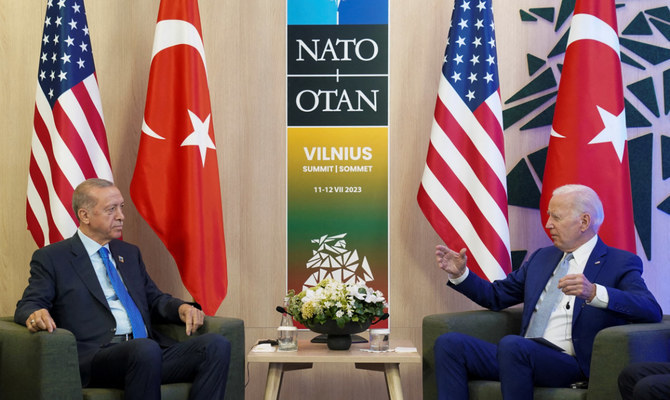
- A new date will soon be set due to a change in Erdogan’s schedule, the Turkish official said
- The source familiar with the matter, speaking on condition of anonymity, said it was unclear what prompted the postponement
WASHINGTON/ANKARA: Turkish President Tayyip Erdogan has postponed a White House meeting with President Joe Biden, a source familiar with the situation and a Turkish official said on Friday of a visit that had been tentatively planned for May 9.
A White House spokesperson, while not confirming the May 9 date, said: “We look forward to hosting President Erdogan at the White House at a mutually convenient time, but we have not been able to align our schedules and do not have any visit to announce at this time.”
A new date will soon be set due to a change in Erdogan’s schedule, the Turkish official said, requesting anonymity. The source familiar with the matter, speaking on condition of anonymity, said it was unclear what prompted the postponement.
The White House never formally announced the visit but a US official told Reuters in late March that following Turkish Foreign Minister Hakan Fidan’s visit to Washington, the White House offered and Ankara had accepted May 9 for a meeting between Biden and Erdogan.
That would have been the first bilateral visit to Washington since 2019 when Erdogan met with then President Donald Trump, a Republican. He and Biden have met a few times at international summits and spoken by phone since the Democratic US president took office in January 2021.
Ties between the US and Turkiye have been long strained by differences on a range of issues. While they have thawed since Ankara ratified Sweden’s NATO membership bid earlier this year, tensions persist over Syria and Russia and the war in Gaza.
Erdogan visited neighboring Iraq this week. Last weekend, he met with Hamas leader Ismail Haniyeh in Istanbul, the first meeting between Erdogan and a Hamas delegation headed by Haniyeh since Israel began its military offensive in the Gaza Strip following Hamas’ Oct. 7 attack.





